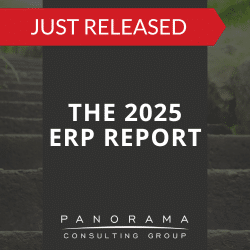- Prevent misinformation in ERP projects with proactive communication, addressing employee concerns, and building a culture of transparency.
- Rumors thrive on uncertainty—establish a single source of truth and consistent updates to counter speculation and ensure clarity.
- Engage stakeholders early and tailor messaging to specific roles to reduce resistance and foster collaboration throughout ERP implementation.
- Address fears of job loss through training, skill development, and by showcasing how ERP systems empower employees to excel.
- Highlight quick wins and leadership visibility to build trust, demonstrate progress, and drive adoption of your ERP system.
In any major organizational change, especially an ERP implementation, rumors and misinformation can spread like wildfire. What begins as innocent speculation or misunderstanding can escalate into disruptive chatter that erodes trust, diminishes morale, and ultimately jeopardizes the success of your ERP project.
Implementing an ERP system is more than a software upgrade—it’s an integral part of your overall digital strategy. Managing ERP implementation rumors and preventing misinformation in ERP projects is therefore essential.
Today, we’ll explore how to address employee concerns, prevent misinformation, and build a culture of transparency that drives ERP project success.
A Failed Payroll System Implementation
Panorama’s Expert Witness team was retained to provide a forensic analysis and written report to the court regarding the failed implementation of a major software developer’s ERP/payroll system.
The Nature of Rumors in ERP Projects: How Small Sparks Become Fires
Rumors thrive where uncertainty exists. Whether employees fear job loss, struggle to understand the project’s goals, or hear conflicting information, unchecked misinformation can stall progress.
If your workforce senses ambiguity or resistance from leadership, small misunderstandings can quickly escalate into damaging misinformation.
For example, consider an employee who overhears that the new ERP system automates supply chain management processes. Without context, they may assume that automation will replace jobs.
A key challenge lies in the timing of communication. If your project team delays addressing concerns or fails to provide updates, employees may fill the information vacuum with speculation.
The Impact on Project Success
As our ERP consulting company can attest, lingering doubts often lead to disengagement and resistance during the critical phases of implementation.
The consequences of unmanaged rumors go beyond morale. Left unaddressed, misinformation can:
- Undermine trust in leadership, weakening change management efforts.
- Slow down ERP adoption due to resistance or skepticism.
- Increase the likelihood of ERP failures as engagement drops and productivity suffers.
- Inflate project costs through last-minute training and other delays.
Proactively Preventing Misinformation in ERP Projects
Addressing ERP project rumors isn’t about reactive damage control—it’s about creating an environment where misinformation struggles to gain traction. Preventing rumors starts with transparency, consistency, and a firm commitment to engaging employees at every step of the journey. Here’s how you can get ahead of the curve.
1. Establish a Single Source of Truth
One of the most effective ways to prevent rumors is to establish a single, authoritative source of information regarding the ERP project. This source could take the form of a dedicated internal portal, ERP project newsletters, or regular town halls led by senior leadership.
If you’re working with an enterprise software consultant, they will tell you to ensure that all project updates, decisions, and FAQs are communicated through a central hub to reduce the risk of conflicting information.
For example, you might assign a senior leader to oversee communication and create resources that employees can reference.
2. Involve Key Stakeholders Early
ERP success depends heavily on stakeholder buy-in, and employees are some of your most critical stakeholders. By involving department heads, subject matter experts, and frontline staff early in the implementation process, you’ll reduce uncertainty and rumors while fostering collaboration.
We recommend engaging teams by explaining how the project aligns with business objectives and benefits them directly.
For example, employees in procurement might appreciate knowing how the new SCM system will streamline their workflow, reduce errors, and save them time.
3. Communicate Clearly and Transparently
Communication isn’t just about frequency—it’s about clarity. Employees must hear a unified message across leadership, managers, and project teams. Mixed signals create confusion and feed rumors.
Transparency is also key. When addressing employee concerns in ERP rollouts, be transparent about challenges. If the project encounters delays or unforeseen obstacles, acknowledge them openly while explaining the steps being taken to resolve the issues. Leaders who communicate with honesty are far more likely to earn trust and quell misinformation than those who attempt to conceal problems.
Our computer software expert witnesses, who frequently analyze ERP failures, often see a common failure point: the absence of role-specific communication leading employees to assume their positions will become obsolete. By clearly explaining how the ERP system will streamline tasks and enhance individual roles, organizations can prevent these rumors and foster a sense of security among employees.
4. Tailor Messaging to Different Audiences
Tailoring communication to specific roles and departments ensures relevance and fosters better understanding. Executives may want high-level updates on ROI and performance, while frontline teams need practical insights into how their workflows will change.
Our ERP consultants often help clients craft targeted communication strategies to highlight real-world benefits relevant to specific roles. For example, while supply chain management teams need information on benefits like streamlined inventory management, finance teams need to know about compliance and reporting-related benefits.
By addressing each audience’s unique concerns, you’ll minimize confusion and demonstrate that leadership values their input.
Addressing Employee Concerns in ERP Rollouts
Even the most carefully planned communication strategy can’t entirely eliminate employee concerns. The following best practices will help you address concerns head-on to dispelling rumors and building confidence in the ERP project.
1. Acknowledge Employee Anxiety and Resistance
Change is inherently uncomfortable. Employees may feel anxious about their job security, workload, or ability to adapt to new technology. Acknowledge these feelings rather than dismissing them. When employees see that leadership recognizes their concerns, they’ll be more open to constructive dialogue.
For example, you might host open forums where employees can ask questions and voice concerns directly to leadership. During these meetings, it’s important to provide honest, empathetic answers and emphasize the long-term benefits of the ERP system.
2. Focus on Training and Skill Development
One of the most common rumors in ERP projects is that new technology will replace employees. Counter this narrative by offering tailored training programs that focus on elevating employees’ value within the organization.
For example, if AI in ERP streamlines invoice reconciliation, help employees develop skills in financial analysis and strategic planning, enabling them to transition into higher-value roles.
3. Showcase Early Wins and Success Stories
One of the most effective ways to combat rumors is to demonstrate tangible success. As your ERP rollout progresses, identify quick wins that showcase the benefits of the new system.
For example:
- “The new SCM software reduced order fulfillment errors by 30% in its first month.”
- “The ERP system has streamlined payroll processing, cutting down reporting time by 50%.”
Highlighting measurable results builds credibility and helps employees see the project’s positive impact firsthand.
Turning Rumors into Opportunities
While rumors and misinformation are inevitable in large-scale ERP projects, they don’t have to derail your success. You hold the power to transform uncertainty into opportunity by fostering open communication, addressing employee concerns, and championing a culture of transparency.
For organizations navigating complex ERP rollouts, partnering with experienced business software consultants can make all the difference. From managing change to ensuring alignment with business goals, expert guidance empowers leadership to focus on what matters most: delivering value and achieving transformational success. Contact us below for a free ERP consultation.














